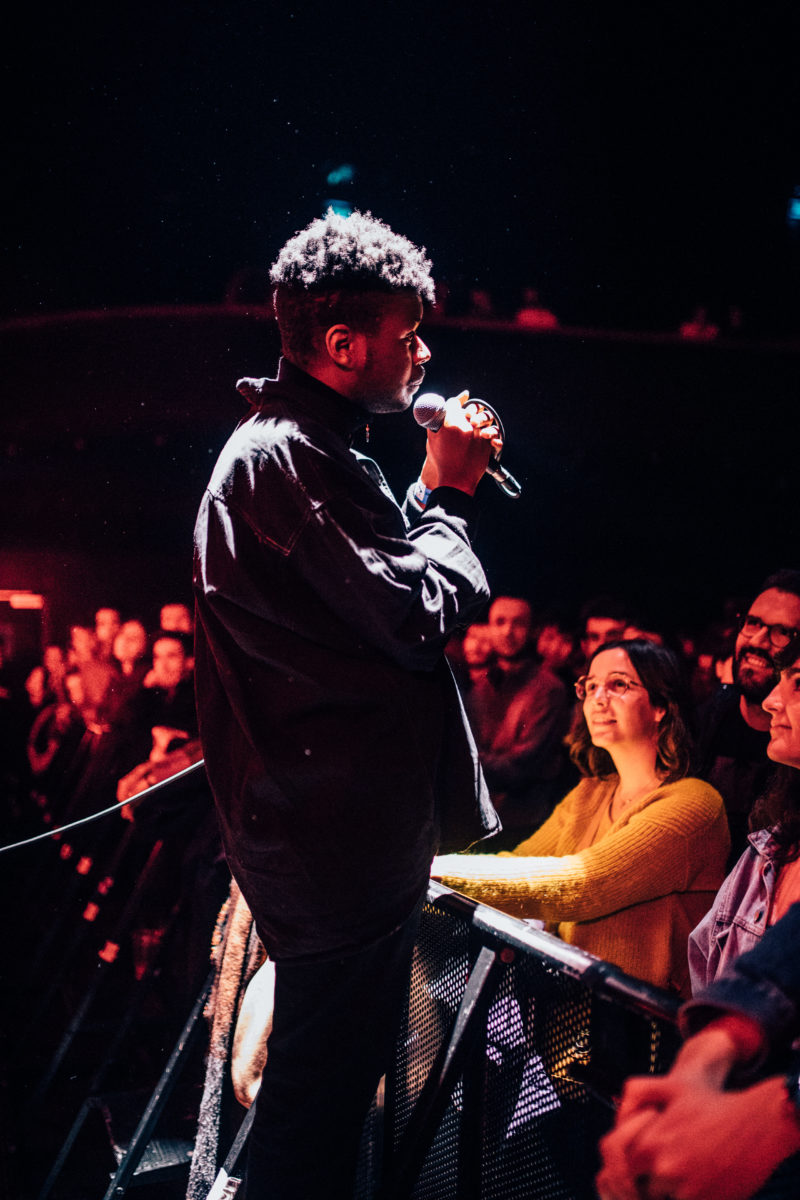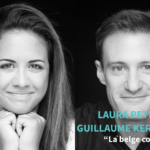Industry award ‘Best Musician’ for David Poltrock & David Numwami
March 8 2019
The Music Industry Awards (MIAs) and the D6bels Music Awards (DMA) are the most important music prizes that are awarded annually in Belgium. Anyone who gets to take an award home, can most definitely look back at a successful year.
Besides the awards chosen by the public, there are also awards, chosen by professionals of the Belgian music industry. One of these sector-awards is the one for ‘Best Musician’, which went to David Poltrock (at the MIAs) and namesake David Numwani (at the D6MA) this year.
After more than 20 years of experience,as live and session musician for a.o. Hooverphonic and Triggerfinger, and as a producer, arranger and composer for various Belgian artists and films, David Poltrock made his debut as a solo-artist in 2018 with his trilogy ‘Moods-Mutes-Machine’. David Numwami is a young session musician and arranger, who made fame with his project “Le Colisée” and seems to be collecting collaborations. His latest collaboration is with no other than the French singer and actress Charlotte Gainsbourg with whom he has been touring the world as her guitarist since two years. He Both musicians have already followed a varied path with many similarities. One of their most significant common characteristics, besides their name, is undoubtedly their love for experimenting with sounds and music.
Congratulations on your award for ‘Best Musician’ at the Music Industry Awards and the D6bels Music Awards. Was this entirely unexpected?
David Poltrock: Yes, it came rather unexpected. I’ve been a professional musician for about 25 years now. At the beginning of my career, people would often talk about how nice it would be were I to be nominated – those were the ZAMU Awards back then. That was the period during which I came into the picture with Hooverphonic. It never happened then, which I did not mind. Now that I released a trilogy in my own name ‘Poltrock’, I presume that it reached the larger public, which probably led to the nomination. It really came as a surprise and winning the prize as well. Although I had a sneaking suspicion the day before, because apparently I was the only nominee to be present, (laughs). In any case, it’s a great honor.
David Numwami: I had really not expected to receive the award. It’s a rather unusual one, I believe. But in any case, it’s very cool.
You’ve already created quite an impressive professional pathway. Could you give a brief overview over your background and career?
David Poltrock: It all started with The Boondocks, a local rock band from Poperinge (Belgium). The band had a few hits in the early 90s and we were in that slipstream of Dutch music with, among others, Gorki, De Mens, Noordkaap. In ’93 we went to the Netherlands to record our second album. I was barely 20 years old and I immediately had the chance to record an album and play at major festivals like Marktrock, Maanrock and the Gentse Feesten.
The real breakthrough, however, happened n ’98, when I ended up with Hooverphonic. From then on it went very fast. I brought Mario Goossens to Hooverphonic, and in turn he introduced me to Monza, the successor of Noordkaap. Suddenly, I played with two bands that did well in Belgium. After that I was asked to play about everywhere. There are very few people with whom I have not played, live or in the studio. Until last year I played with Hooverphonic, but now I’m focusing on my own projects and I only still play with De Mens. Now that I have more time, I receive requests to make pitches for film music. Until 5 years ago, producing was my main thing, but I don’t have time for that anymore.
David Numwami: My background may be somewhat atypical for a musician, as I studied philosophy and did not attend any conservatory. During my studies, I started recording pieces of music in my room and I set up the project which I called “Le Colisée”. This enabled me to meet other musicians and play my first concerts. In my last year at university, I was contacted by the French group François and the Atlas Mountains to join them as a musician during their one-year tour. In short, by making music for myself, I actually started making music with and for others.
When did you decide to make a career as a musician?
David Poltrock: As a child, it was the thing I was dreaming of. I wanted to study music but my parents did not approve. Hence, I studied languages. After my studies, I managed to get them to pay a year of music studies, which was at Jazz Studio, initially, and at the Conservatory of Ghent, later on.
David Numwami: When the tour with the French band was over and I had finished my studies, I tried to find a job as a philosophy teacher. On a professional level, I did not really project myself as a musician because I had only just graduated. Finally, I received that proposal from Charlotte Gainsbourg to join her during her tour, which I worked on for almost two years. Touring is very addictive, so at this moment I tell myself that I’m a musician. But when this tour comes to an end, we shall see. I live much more from day to day and I am open to anything.
How did you reach the level you’re at today?
David Poltrock: First, by working hard. When I was studying, I sat behind my piano for about 7 to 8 hours a day to try and master it as well as possible. Moreover, at a given moment you simply have to realize that there are certain things that you cannot do, and I managed to do so pretty well. Then it’s up to you to enlarge those things that you are actually good at. In my case, that is playing with sounds. I am not the typical musician who can play virtuosically fast, but I usually have a good understanding of what kind of sound is needed for a certain song. I prefer playing two notes with absolutely the right sound over a full track, than playing a hundred notes that lead nowhere. Furthermore, I am not only a musician, but also a composer, arranger, producer, I teach at PXL-Music… That combination ensures that I, as a musician, never had to worry about a work. There would always be something new coming my way. Just being a performing musician would be very difficult and I would not be in the position I am in right now. In Belgium it is impossible to get by, merely being a performing musician.
The world of acting and music often goes hand in hand with a long, hard battle for everyone who wants to make it. What advice would you give young actors and musicians?
David Numwami: I think that what helps me is to always have a project of my own, and not to rely on others. Being a tour musician is full of nice surprises and allows you to meet interesting people, but it’s important to have your own project. And another important thing is not to be too hurried, do not underestimate that things can take time. Do not rush and have confidence, taking time allows you to make more thoughtful decisions.
David Poltrock: It’s the same advice that I give my students, that is: diversify and think outside the niche that you belong to, or the area you excel in. Try to be a recording engineer, try to arrange, to compose, to produce, so that you are not just dependent on playing music. It’s also important to expand your network in Belgium: be visible, go out there, be pleasant to deal with.
How would you describe the Belgian music scene?
David Numwami: I would say that it is a world where there is a lot to do again, for the French part anyway. There was a great period with the label Disques du Crépuscule for example. We had a super rock generation in the 2000s, another great generation for indie music a few years ago. And now it feels like there is plenty of space, I see new collectives, new scenes. On the other hand, the Belgian hip-hop scene is doing very well. But I have the impression that for pop, rock and experimental music there is again a kind of vacant place. That only happens every 10 years, so we must take advantage of that now.
David Poltrock: Small! We can hardly speak about a Belgian music scene, because there is very little contact between the Flemish and the Walloon music scene. When you’re in it for a few years, you basically know everyone. In Germany, every scene is a world in itself. The urban scene, for example, the rock scene, the pop scene, etc. Those markets are bigger there, so the different scenes are way more viable. In Belgium, these scenes have only started to manifest themselves in recent years. The Indie scene has always been more European and international, but the pop & rock scenes remain very small.
Do you consider yourself, as a musician, sufficiently informed about your rights (not only about those rights managed by management companies, but in general)?
David Poltrock: I believe it is the musician’s duty to do that himself. Do we ask a baker whether he is sufficiently informed about public health issues? No. He needs to look for that himself, and the same goes for artists. There exist enough services that inform musicians. I do not think that a management company should inform musicians individually. Everyone knows that their questions will be answered by PlayRight, SABAM, etc.
David Numwami: I don’t consider myself sufficiently informed. I have only just registered with PlayRight. I was familiar with the French equivalent because I had received a T-shirt from them during a concert, but I did not know much more about it. Recently I applied for the artist statute, and at the moment that suits me well, but I am not really aware yet of any alternatives. Many of my musician colleagues advised me to apply for this statute, since I am fortunate enough to have a regular activity going on (the tour). So that’s what I did.
How could we better inform our musicians on their rights?
David Poltrock: I need to say that I let someone else manage my rights for PlayRight, and I trust that person for a 100%. So I don’t need to worry too much about all of this. PlayRight has done a very good effort after that total chaos at Uradex. Everything is way clearer now.
David Numwami: If we’d look out more and inform ourselves better, I believe that we could find enough information. But I feel that people around me lack the knowledge about rights, statutes, average wages etc. The same goes for me. And I think that we, as artists, prefer to spend our time creating things rather than completing administrative tasks. I believe it’s important to surround myself with professionals who know what they are talking about, that’s why my manager does all the administrative work for me.
What are you current and future projects?
David Poltrock: : I’m eager to start my fourth album. As it looks now, it will be extremer than the previous ones. It’ll be much more acoustic on the one hand, and much more experimental, on the other. But I cannot really say more about it yet. First, I have to finish some music projects for a documentary and a few films. In addition, we’ll also go on tour with De Mens, and in autumn I will do another project with Mario Goossens.
David Numwami: I am currently working on an album that is a combination of ‘chanson’ and pop, which I would like to release by the end of this year. This combination of styles makes my pieces often rather bizarre, which is one of the reasons why people want to work with me, I think. I made two songs with Moodoïd and worked with Xavier Veilhan (Venice Biennale), for instance, and recently I collaborated with Nicolas Godin from the band Air, whose album will be released soon. On top of that, I’ve been composing and writing my own songs and I’ll be playing at the Botanique on the 26th of April. I will keep on composing and writing for other artists, as well, and I’m still active as a session musician, so I spend a lot of time in the studio. And the studio is what I prefer, because a recording will always last. It confirms our work as musicians. A concert, on the other hand, is more like a moment of interaction, while the studio allows us to re-record pieces, re-listen and re-work a thousand times.
Listen to David Poltrock :
Listen to a track of David Numwami (while we’re awaiting his full album):




